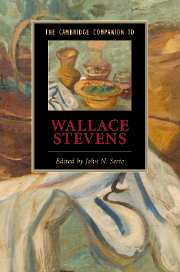Book contents
- Frontmatter
- Introduction
- 1 Wallace Stevens: A Likeness
- 2 Stevens and Harmonium
- 3 Stevens in the 1930s
- 4 Stevens and the supreme fiction
- 5 Stevens’ late poetry
- 6 Stevens and his contemporaries
- 7 Stevens and romanticism
- 8 Stevens and philosophy
- 9 Stevens’ seasonal cycles
- 10 Stevens and the lyric speaker
- 11 Stevens and linguistic structure
- 12 Stevens and painting
- 13 Stevens and the feminine
- 14 Stevens and belief
- Further reading
- Index
7 - Stevens and romanticism
Published online by Cambridge University Press: 28 May 2007
- Frontmatter
- Introduction
- 1 Wallace Stevens: A Likeness
- 2 Stevens and Harmonium
- 3 Stevens in the 1930s
- 4 Stevens and the supreme fiction
- 5 Stevens’ late poetry
- 6 Stevens and his contemporaries
- 7 Stevens and romanticism
- 8 Stevens and philosophy
- 9 Stevens’ seasonal cycles
- 10 Stevens and the lyric speaker
- 11 Stevens and linguistic structure
- 12 Stevens and painting
- 13 Stevens and the feminine
- 14 Stevens and belief
- Further reading
- Index
Summary
For Wallace Stevens, the romantic period extends from the late eighteenth century through the late nineteenth century, and it includes both English and American writers. The chief romantic influences on Stevens' poetry include Wordsworth, Shelley, Keats, Emerson, Whitman, and Tennyson. (There are lesser echoes of Blake and Coleridge; Byron seems to have had little impact.) Stevens was born in 1879, and both Whitman and Tennyson died in 1892. For Stevens, then, romanticism was not a remote historical episode. It overlapped with his own life, and it formed the immediate historical background to his life's work as a poet. Moreover, in Stevens' conception, romanticism is not just a single historical period. It is a recurrent mode of the poetic imagination, and for Stevens that mode constitutes the wellspring of all poetic vitality.
In a letter of 1940 - when he was sixty years old and writing the poems included in Parts of a World - Stevens succinctly sketched out a comprehensive theory of poetic history as a cycle. The cycle begins in romanticism, as a phase of imaginative vitality, moves in a degenerative direction leading to exhaustion, and then returns to romanticism. “I suppose that the way of all mind is from romanticism to realism, to fatalism and then to indifferentism, unless the cycle re-commences and the thing goes from indifferentism back to romanticism all over again” (L 350). The middle terms in this sequence take their inflection from the direction of the sequence. For Stevens, romanticism is the highest form of imaginative fulfillment. “Realism” might seem a neutral or even positive term, but “fatalism” has a sinister ring, and “indifferentism” is unmistakably negative in connotation. Indifferentism is a blank absence of interest and pleasure in the world. “Realism” and “fatalism” thus measure out stages in the descent from fulfillment to despair.
- Type
- Chapter
- Information
- The Cambridge Companion to Wallace Stevens , pp. 87 - 102Publisher: Cambridge University PressPrint publication year: 2007
- 2
- Cited by



